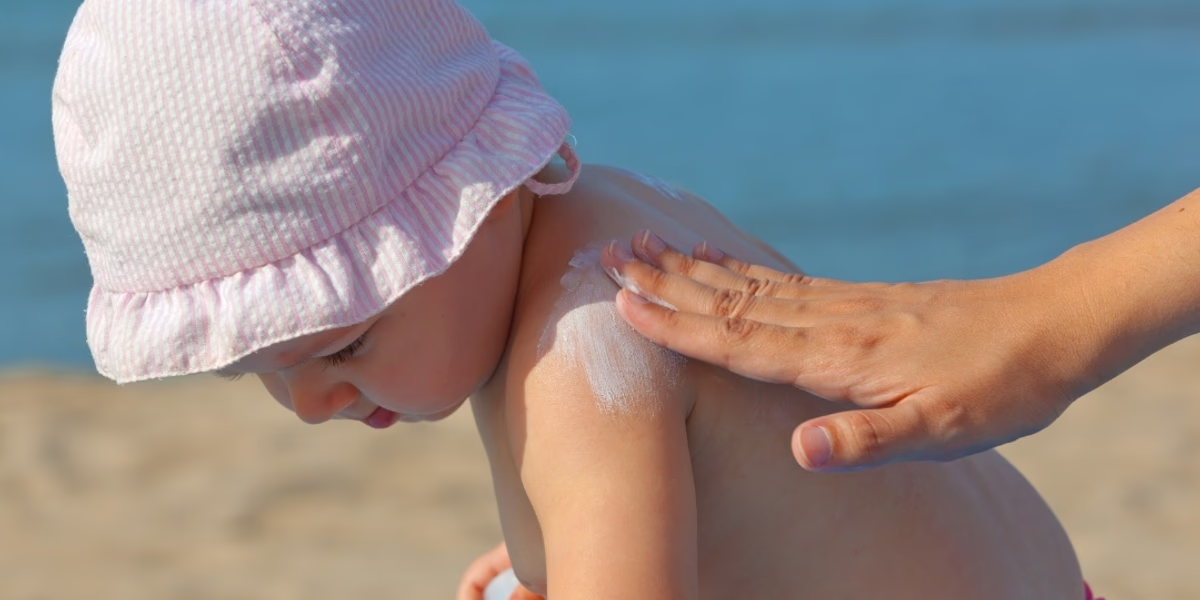The importance of preserving the health and safety of your children’s delicate skin cannot be underestimated, especially during the summer season when the risks are heightened. The scorching sun rays, aggressive chlorine in pools, and abrasive sand can all have detrimental effects on their sensitive skin. To ensure optimal protection, it is crucial to take measures tailored to their skin sensitivity. To guide you in this endeavor, here are some practical tips to implement:
Understanding Children’s Skin Sensitivity
Children’s skin is distinguished by its thinness and heightened sensitivity compared to that of adults. It is also more vulnerable to the harmful effects of ultraviolet (UV) rays from the sun. As a result, adopting protective measures suited to their fragility is essential.
Use an Appropriate Sunscreen
Sunscreen is the essential cornerstone of protection against UV rays. Choose a broad-spectrum sunscreen with a sun protection factor (SPF) of at least 30. Generously apply sunscreen to all exposed areas of your child’s skin, preferably 15 to 30 minutes before sun exposure. Remember to reapply every two hours and after each swimming session.
Dress Your Children Smartly
Choose lightweight clothing that effectively covers their skin. Opt for long-sleeved shirts, long pants, and wide-brimmed hats to protect their face and neck from the sun’s rays. Prioritize tightly woven fabrics that offer better protection against UV rays. If possible, look for clothing with integrated sun protection for added safety.
Avoid Peak Hours
Between 10 a.m. and 4 p.m., the sun’s rays are most aggressive. During this time, try to keep your children in the shade as much as possible. Plan outdoor activities in the morning or late afternoon when the sun is less intense.
Hydrate Your Children’s Skin
Hydration is essential to maintain your children’s skin health. Ensure they drink enough water throughout the day to prevent dehydration. Additionally, use a gentle and hypoallergenic moisturizer for their skin, especially after sun exposure or swimming. This will help maintain a healthy skin barrier and prevent dryness.
Cleanse Gently
When cleaning your children’s skin, it is crucial to use mild products specifically designed for their delicate skin. Avoid scented or irritating soaps that can cause irritation. Opt for gentle and moisturizing cleansers specially formulated for children.
Monitor Signs of Skin Issues
It is important to be vigilant about signs of skin problems such as rashes, itching, redness, or even blisters. If you notice anything unusual, it is highly recommended to consult a pediatric dermatologist. These skin professionals can provide an accurate diagnosis and offer tailored treatment for the situation.
Prevent Chlorine and Sand-related Issues
Chlorine in pools and sand can cause skin irritations in toddlers. Before allowing them to dive into the crystal-clear water, ensure thorough rinsing of their skin with clean water to remove any chlorine residue. After swimming, it is essential to gently cleanse their skin using a mild soap to eliminate chlorine and sand. Don't forget to moisturize their skin to prevent any risk of dryness.

Atopic Skin Requires Special Attention
If your child has atopic skin, it is important to take extra precautions during the summer. Use products specifically designed for atopic skin, such as moisturizers rich in nourishing and soothing agents. Avoid products containing perfumes or irritating substances that could worsen the symptoms.
Consult a Pediatric Dermatologist
Finally, don’t hesitate to consult a pediatric dermatologist for personalized advice based on your child’s specific skin needs. They can assess the condition of their skin, provide suitable recommendations, and address any concerns or issues that may arise. A pediatric dermatologist is a trained professional who specializes in diagnosing and treating skin conditions in children. They can provide expert guidance on how to best protect your child’s delicate skin during the summer months.
Frequently Asked Questions
Q: From what age can I start applying sunscreen to my baby’s skin?
A: It is recommended not to apply sunscreen to babies under 6 months old. At this age, it is best to keep babies in the shade, dress them in protective clothing, and put on a wide-brimmed hat. For babies older than 6 months, choose a sunscreen specifically formulated for children and apply it generously to all exposed parts of their skin.
Q: What is the best way to protect my child’s eyes from the sun’s rays?
A: Children’s eyes are sensitive to UV rays, so it is important to protect them with appropriate sunglasses. Make sure to choose sunglasses specifically designed for children, providing maximum UV protection. Opt for wrap-around styles that cover the eyes and the surrounding area.
Q: Is it safe to use insect repellents on my child’s skin?
A: Using insect repellents can be safe for children, but it is important to choose products specifically formulated for their delicate skin. Avoid applying the repellent directly on your child’s face and hands. Instead, apply it to their clothing following the manufacturer’s instructions. Also, avoid areas where the skin is irritated or injured.
Q: How can I tell if my child has an allergic reaction to sunscreen or skincare products?
A: Allergic reactions can manifest as redness, itching, rashes, or swelling. If you notice such symptoms after applying sunscreen or skincare products, immediately stop using them. Consult a pediatric dermatologist for an accurate diagnosis and appropriate recommendations.
Q: How can I protect my child’s skin when playing in the sand?
A: When your child plays in the sand, make sure to thoroughly rinse their skin with clear water after the activity. This will help remove sand particles and reduce the risk of irritation. After rinsing, moisturize their skin with a gentle and non-comedogenic moisturizer to prevent dryness.
If you have any other questions or concerns about protecting your children’s skin during summer, do not hesitate to consult a pediatric dermatologist. They are best equipped to answer your specific questions and provide advice tailored to your child’s skin.
Take care of your children’s fragile skin during summer by following these tips and staying vigilant for signs of skin issues.
Protect them from the sun with suitable sunscreen, dress them appropriately, avoid peak hours, hydrate their skin, and cleanse it gently.
If your child has atopic skin, take extra precautions and use suitable products. Remember to consult a pediatric dermatologist for personalized advice.
Note: The information provided in this article is for informational purposes only and should not replace the medical advice of a healthcare professional. If you have specific concerns about your child’s skin, consult a pediatric dermatologist.
